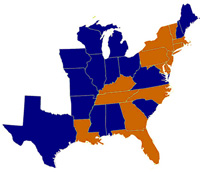By the Numbers: Election Maps
During modern presidential campaigns and elections, red-and-blue maps dominate reporting on politics, tracking the success of candidates and their parties state by state. Check out these older maps, drawn from 19th-century presidential elections. The colors indicate Electoral College results for each state then in existence. Figure out what year each election occurred.
1.  1848
1848
Blue: Democrat
Orange: Whig
Whig Zachary Taylor beat Democratic candidate Lewis Cass. Third party Free Soil candidate Martin Van Buren did not get one electoral vote.
2.  1856
1856
Blue: Democrat
Red: Republican
Yellow: Know Nothing
Democrat James Buchanan won with 174 electoral votes over Republican John C. Fremont's 114 and Whig-American Millard Filmore's 8.
3.  1852
1852
Blue: Democrat
Orange: Whig
Democrat Franklin Pierce beat out Whig candidate Winfield Scott. The popular vote was much closer than the electoral vote: 50.8% to 43.9%.
4.  1860
1860
Red: Republican
Blue: Democrat (Southern)
Yellow: Constitutional Union
Green: Democrat
Sectional divide split the nation prior to the Civil War when Republican Abraham Lincoln won the election. John Breckinridge led the Southern Democrats, John Bell ran for the Constitutional Union party, and the northern Democratic candidate was Stephen Douglas.
5.  1844
1844
Blue: Democrat
Orange: Whig
Democrat James K. Polk won over Whig candidate Henry Clay.
6.  1840
1840
Blue: Democrat
Orange: Whig
Whig candidate William Henry Harrison beat Democratic candidate Martin Van Buren with 234 electoral votes to 60.
7.  1864
1864
Red: Republican
Blue: Democrat
This mid-Civil War election map reflects the separation between North and South. Republican Lincoln beat Democrat George McClellan.













